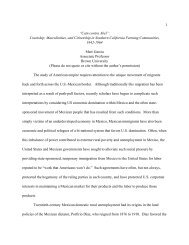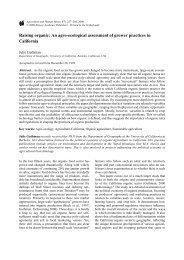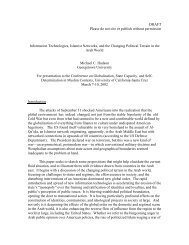The Death of Ramon Gonzalez and the 21st Century Dilemma
The Death of Ramon Gonzalez and the 21st Century Dilemma
The Death of Ramon Gonzalez and the 21st Century Dilemma
Create successful ePaper yourself
Turn your PDF publications into a flip-book with our unique Google optimized e-Paper software.
Environment. Cambridge: Harvard; Joseph E. Stiglitz, 2002. Globalization <strong>and</strong> Its Discontents. New York:<br />
Norton; Jagdish Bhawati, 2004. In Defense <strong>of</strong> Globalization. Oxford, New York: Oxford; Amartya Sen,<br />
1999. Development <strong>and</strong> Freedom. R<strong>and</strong>om House: New York. Many websites track globalization from a<br />
perspective similar to <strong>the</strong> one presented here, among <strong>the</strong>m, www.foodfirst.org<br />
iii Many websites track globalization from a perspective similar to <strong>the</strong> one presented here.<br />
www.foodfirst.org is one <strong>of</strong> <strong>the</strong>se <strong>and</strong> <strong>of</strong>fers multiple links to o<strong>the</strong>rs.<br />
iv To <strong>the</strong> many studies on <strong>the</strong> left, such as Sen <strong>and</strong> Stiglitz that emphasize growing inequalities, one can<br />
contrast a series <strong>of</strong> World Bank studies in 2004 that maintain that inequality is not on <strong>the</strong> increase, (David<br />
Dollar. “Globalization, poverty, <strong>and</strong> inequality since 1980.” WPS3333.) <strong>and</strong> World Bank studies that<br />
recognize a complex array <strong>of</strong> inequalities balanced against advances in general welfare (Martin Ravallion<br />
“Looking beyond averages in <strong>the</strong> trade <strong>and</strong> poverty debate.” WPS3461 <strong>and</strong>, anonymous, “Pro-growth, propoor:<br />
is <strong>the</strong>re a trade-<strong>of</strong>f” WP3378) all Washington DC: World Bank.<br />
v Of <strong>the</strong> many treatments <strong>of</strong> <strong>the</strong> Zapatistas, George Collier’s Basta: L<strong>and</strong> <strong>and</strong> <strong>the</strong> Zapatista Rebellion in<br />
Chiapas st<strong>and</strong>s out because <strong>of</strong> its sober judgments <strong>and</strong> historical depth based on <strong>the</strong> author’s more than<br />
thirty years experience as an anthropological researcher in Chiapas. 1999. Oakl<strong>and</strong>: Institute for Food <strong>and</strong><br />
Development Policy. For a focus on <strong>the</strong> issues treated here, see also Tom Barry, 1995. Zapata’s Revenge:<br />
Free Trade <strong>and</strong> <strong>the</strong> Farm Crisis in Mexico. Boston: South End.<br />
vi J.F. Hornbeck, 2004. NAFTA at Ten: Lessons from Recent Studies. Washington D.C.: Congressional<br />
Research Service, Library <strong>of</strong> Congress.<br />
vii A running account <strong>and</strong> analysis <strong>of</strong> <strong>the</strong>se figures may be found at <strong>the</strong> website <strong>of</strong> <strong>The</strong> Environmental<br />
Working Group, www.ewg.org<br />
viii John. J. Audley, Demetrios G. Papademetriou, S<strong>and</strong>ra Polaski, Scott Vaughan, 2004. NAFTA’s Promise<br />
<strong>and</strong> Reality: Lessons from Mexico for <strong>the</strong> Hemisphere. Washington, D.C.: Carnegie Endowment for<br />
International Peace, ch. 1. Controversy over <strong>the</strong>se figures <strong>and</strong> over <strong>the</strong> effect on migration is intense—my<br />
confidence in <strong>the</strong> logic <strong>of</strong> <strong>the</strong> analysis presented in <strong>the</strong> first chapter <strong>of</strong> <strong>the</strong> Carnegie report is a judgment<br />
based on <strong>the</strong> view that, a)<strong>the</strong> effect <strong>of</strong> Article 27 reforms should be combined with <strong>the</strong> effect <strong>of</strong> NAFTA as<br />
<strong>the</strong>y constitute part <strong>of</strong> <strong>the</strong> same neo-liberal initiative, b)it is unreasonable to believe that <strong>the</strong> massive<br />
increase in corn imports has had a negligible effect on small-scale corn producers, c)<strong>the</strong> shift <strong>of</strong> investment<br />
to irrigated agriculture that is agreed to have occurred because <strong>of</strong> NAFTA is bound to have had a<br />
significant effect on producers without irrigation, d)arguing from many different lines <strong>of</strong> evidence, it is<br />
clear that migration to <strong>the</strong> U.S. has increased significantly, in spite <strong>of</strong> its increased costs <strong>and</strong> risks, <strong>and</strong> e)I<br />
am reluctant to completely dismiss <strong>the</strong> claims <strong>of</strong> peasants <strong>and</strong> migrants <strong>and</strong> <strong>the</strong>ir organizations in Mexico<br />
that <strong>the</strong> effect is large. Hornbeck, cited above, disagrees <strong>and</strong> cites o<strong>the</strong>r studies that support his judgment.<br />
ix Information on San Jeronimo up to August, 2004 is based on interviews <strong>and</strong> personal communications<br />
from Michael Kearney <strong>and</strong> Carole Nagengast, who continue <strong>the</strong>ir long-term study <strong>of</strong> San Jeronimo.<br />
x Based on my visits to coastal communities <strong>and</strong> informal interviews, January, 2000.<br />
xi Sergio Zendejas <strong>and</strong> Pieter de Vries, 1995. Rural Transformations Seen from Below: Regional <strong>and</strong> Local<br />
Perspectives from Western Mexico. Transformation <strong>of</strong> Rural Mexico, #8. La Jolla: Center for U.S.-<br />
Mexican Studies, UCSD. Billie R. DeWalt, Martha W. Rees, with Arthur D. Murphy, 1994. <strong>The</strong> End <strong>of</strong> <strong>the</strong><br />
Agrarian Reform in Mexico: Past Lessons, Future Prospects. Transformation <strong>of</strong> Rural Mexico, #3. La<br />
Jolla: Center for U.S.-Mexican Studies, UCSD.<br />
xii Lynn Stephen, 2002. “In <strong>the</strong> Wake <strong>of</strong> <strong>the</strong> Zapatistas: U.S. Solidarity Work on Chiapas.” In David Brooks<br />
<strong>and</strong> Jonathan Fox, eds., 2002. Cross Border Dialogues: U.S. Mexico Social Movement Networking. La<br />
Jolla: Center for U.S.-Mexican Studies, UCSD.<br />
xiii In addition to <strong>the</strong> work cited in <strong>the</strong> first edition, see Carole Nagengast <strong>and</strong> Michael Kearney, 1990.<br />
“Mixtec Ethnicity, Social Identity, Political Consciousness, <strong>and</strong> Political Activism.” Latin American<br />
Research Review 25, no. 2.<br />
13 Jonathan Fox <strong>and</strong> Gaspar Rivera-Salgado, 2004. Indigenous Mexican Migrants in <strong>the</strong> United States. La<br />
Jolla: Center for U.S.-Mexican Studies, UCSD. Leah K. VanWey, Ca<strong>the</strong>rine Tucker, Eileen Diaz<br />
Mcconnel, 2005. “Community Organization, Migration, <strong>and</strong> Remittances in Oaxaca.” Latin American<br />
Research Review. V40, no.1, Feb.<br />
xv Michael Kearney <strong>and</strong> Federico Besserer, 2004. “Oaxacan Government in Transnational Context.” Ch.17<br />
in Fox <strong>and</strong> Rivera-Salgado.





